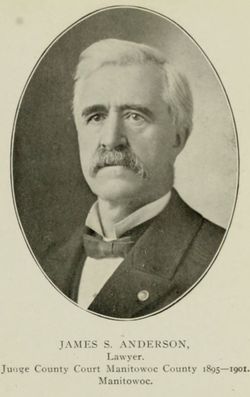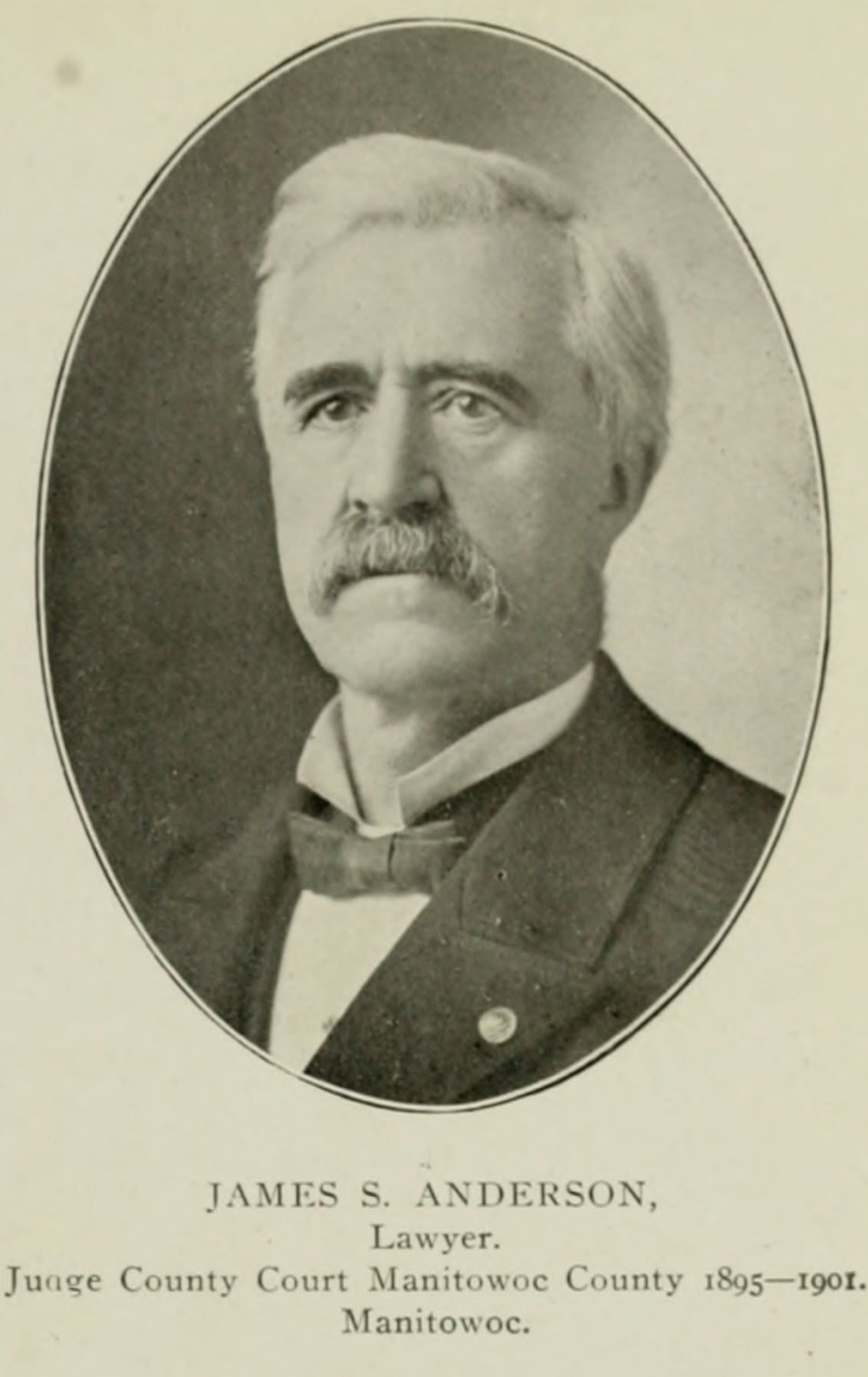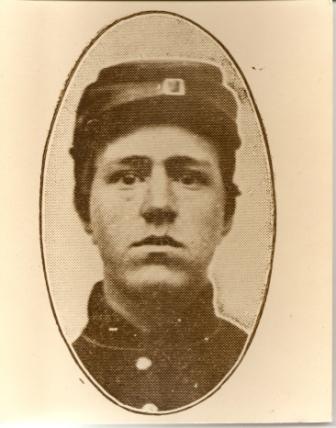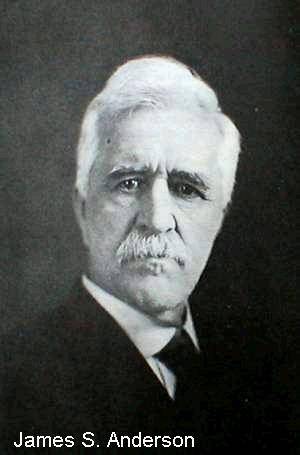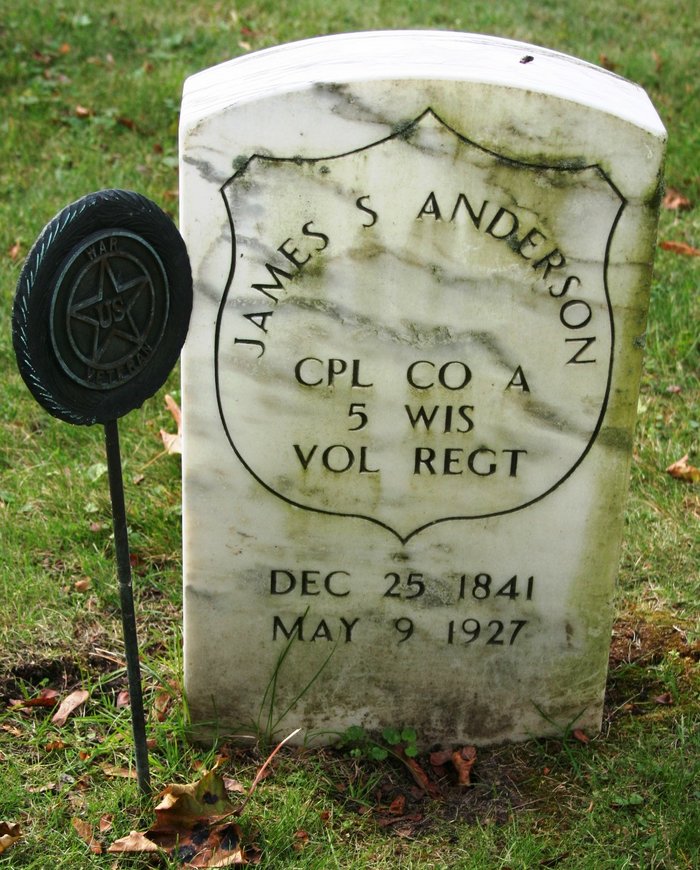This is a bio. sketch from "History of Manitowoc County Wisconsin" by Dr. L. Falge, 1911-1912, v.2, p.180-184.
James Sibree Anderson, one of the leading members of the Manitowoc legal profession, has served the people in various offices of honor and trust, and established a record that is honored and admired by lawyers throughout the state. His administration of the offices he has filled has distinguished him as one of the brilliant men of his day and community. As a judge he has been fearless, but at all times just; no one can say of him that he has ever been influenced by prejudice, nor can any one point to a single instance where personal favor has been shown. He has behind him over
fifty years of public service in the varied capacities of soldier, lawyer, editor, legislator and judge. That he has served the people for such a long period without the slightest blot to mar his record is an achievement which
should be gratifying to him and of which his family may justly speak with pride in the years to come. Judge Anderson was born December 25, (Christmas) 1841, at a place called
Kelvin Haugh, now a part of the city of Glasgow, Scotland. He was the son of John and Harriet (Sibree) Anderson. John Anderson had been a line officer in the British army for over seven years, serving with the Seventy-first Highland Regiment in India, Ceylon and the West India islands. On his return from the army he entered business as a calico printer. The family came to the United States in July, 1852, and in September settled in Manitowoc county at Kossuth, then a part of Cooperstown, a wild tract of country with but few settlers. They resided there until the spring
of 1855, clearing off a tract of land as a farm. They then removed to the village of Manitowoc. The elder Mr. Anderson entered the employ of B. Jones & Company, lumber manufacturers, and remained with that firm until his death in 1869. He was a man of good education, an unwearied reader of good books, had traveled much and was an interesting conversationalist. He was one of the founders of the Presbyterian church of Manitowoc and held several minor offices in the town and village government. When the family
came to America it consisted of the father and mother, two sons and two daughters. The younger son died in infancy a few months after settling in this county. All the family are now deceased except the subject of this sketch. Judge Anderson received his primary education in private schools in Scotland and public schools in Manitowoc, supplemented with some private instruction and was prepared to enter college when the Civil war began. He volunteered at once enlisting April 21, 1861. His company was assigned as
company A, Fifth Wisconsin Infantry, and he served in that organization for three years and four months. During that period he was appointed corporal and sergeant, holding the latter rank at the time of his discharge. During the remainder of the war he served in the provost marshal's department on special duty. The Fifth Wisconsin was one of the noted regiments of the war and was known in the Sixth Corps, Army of the Potomac, as the "Fighting Fifth." Its list of engagements up to the time of expiration of the service of the original regiment comprises twenty-two general battles and sixteen heavy skirmishes, at all of which Judge Anderson was present, being thrice wounded. In his entire service he was absent from the regiment only forty-eight hours and then by reason of wounds. On his return to civil life he determined to enter the legal profession and as preliminary thereto entered Lawrence University at Appleton, Wisconsin, at the fall semester of 1865 and graduated in the class of 1870 with the degree of B. S., later acquiring the M. S. degree. One of his classmates is Hon. L. J. Nash, also of the Manitowoc bar. During part of his college course he was engaged in teaching and was principal of graded schools in the cities of Depere and Two Rivers, Wisconsin. During the vacations and intervals of his college course he read law with Judge Meyers of Appleton and after his graduation he entered the office of Hon. J. D. Markham in Manitowoc and was admitted to practice on examination in open court at the fall term of 1871. Since that time he has practiced his profession
continuously. He opened an office in the city of Manitowoc in June, 1872, and has practiced alone except for three years during which he was in partnership with Henry Sibree, Esq, the firm being Sibree & Anderson. Although much interested in politics he has never allowed himself to be
turned from his profession. He was on the stump as a political speaker in every presidential campaign until his appointment as judge of the county court in August, 1895. He is a ready, fluent speaker, holding and commanding the attention of his audiences, and is much sought for as an
orator on patriotic occasions. Although an ardent republican in a county strongly democratic, he has always held the respect of those who disagreed with him and was frequently appointed to such offices as he would accept. Every office held by him has been connected with his profession. He was
repeatedly appointed city attorney and was also police justice of Manitowoc during a great part of the time that office was in existence. He represented the city district in the state legislature during the years 1889-1890, and as stated was county judge for nearly seven years. For many
years he has been and still is a commissioner of the circuit court. In the course of his work his appearances in the higher courts, both federal and state, have been frequent, and his name is connected with many cases in the published reports. The only thing which has ever diverted his attention from law work is his love for literature. He has a large private library of the best authors, ancient and modern, and there his spare hours are happily spent. He is a
ready and forcible writer and his numerous contributions to magazines and the metropolitan press have given him a wide reputation. In 1883 he purchased the Lake Shore Times, a weekly newspaper published in Manitowoc, and managed it until late in 1886, when finding editorial labor took too
much of his time from law work, he sold it. In the management of his paper he was assisted by his wife, a lady of unusual culture and ability as a writer. As might be expected, the army life of Judge Anderson impressed him deeply and he is a prominent member of the Grand Army of the Republic. He organized the Post of Manitowoc, Horace M. Walker Post, No. 18, Grand Army of the Republic, serving as its first commander and for many years thereafter. He was also instrumental in organizing other posts in the neighboring counties. He has held frequent appointments on the staff of the department commander and was judge advocate of the state. He has been a member of the Masonic fraternity since 1867, and is now connected with the lodge, chapter and council. The judge holds that every man should have a "fad" on which to bestow his hours of recreation. His is horticulture. He has a tract of land comprising several acres just outside the city where he runs a sort of experimental orchard and fruit garden, planting and caring for all sorts of fruit and ornamental trees and shrubbery.
On July 17, 1873, he was married to Eva M. Mills, only daughter of Circuit Judge J. T. Mills, of Grant county, Wisconsin. They have two children: Jean H., teacher of languages, who has taught in the high school at Menasha, Wisconsin, and Illinois College, Jacksonville, Illinois; and
Joseph Mills, a civil engineer, now in charge of large construction work in British Columbia.
This is a bio. sketch from "History of Manitowoc County Wisconsin" by Dr. L. Falge, 1911-1912, v.2, p.180-184.
James Sibree Anderson, one of the leading members of the Manitowoc legal profession, has served the people in various offices of honor and trust, and established a record that is honored and admired by lawyers throughout the state. His administration of the offices he has filled has distinguished him as one of the brilliant men of his day and community. As a judge he has been fearless, but at all times just; no one can say of him that he has ever been influenced by prejudice, nor can any one point to a single instance where personal favor has been shown. He has behind him over
fifty years of public service in the varied capacities of soldier, lawyer, editor, legislator and judge. That he has served the people for such a long period without the slightest blot to mar his record is an achievement which
should be gratifying to him and of which his family may justly speak with pride in the years to come. Judge Anderson was born December 25, (Christmas) 1841, at a place called
Kelvin Haugh, now a part of the city of Glasgow, Scotland. He was the son of John and Harriet (Sibree) Anderson. John Anderson had been a line officer in the British army for over seven years, serving with the Seventy-first Highland Regiment in India, Ceylon and the West India islands. On his return from the army he entered business as a calico printer. The family came to the United States in July, 1852, and in September settled in Manitowoc county at Kossuth, then a part of Cooperstown, a wild tract of country with but few settlers. They resided there until the spring
of 1855, clearing off a tract of land as a farm. They then removed to the village of Manitowoc. The elder Mr. Anderson entered the employ of B. Jones & Company, lumber manufacturers, and remained with that firm until his death in 1869. He was a man of good education, an unwearied reader of good books, had traveled much and was an interesting conversationalist. He was one of the founders of the Presbyterian church of Manitowoc and held several minor offices in the town and village government. When the family
came to America it consisted of the father and mother, two sons and two daughters. The younger son died in infancy a few months after settling in this county. All the family are now deceased except the subject of this sketch. Judge Anderson received his primary education in private schools in Scotland and public schools in Manitowoc, supplemented with some private instruction and was prepared to enter college when the Civil war began. He volunteered at once enlisting April 21, 1861. His company was assigned as
company A, Fifth Wisconsin Infantry, and he served in that organization for three years and four months. During that period he was appointed corporal and sergeant, holding the latter rank at the time of his discharge. During the remainder of the war he served in the provost marshal's department on special duty. The Fifth Wisconsin was one of the noted regiments of the war and was known in the Sixth Corps, Army of the Potomac, as the "Fighting Fifth." Its list of engagements up to the time of expiration of the service of the original regiment comprises twenty-two general battles and sixteen heavy skirmishes, at all of which Judge Anderson was present, being thrice wounded. In his entire service he was absent from the regiment only forty-eight hours and then by reason of wounds. On his return to civil life he determined to enter the legal profession and as preliminary thereto entered Lawrence University at Appleton, Wisconsin, at the fall semester of 1865 and graduated in the class of 1870 with the degree of B. S., later acquiring the M. S. degree. One of his classmates is Hon. L. J. Nash, also of the Manitowoc bar. During part of his college course he was engaged in teaching and was principal of graded schools in the cities of Depere and Two Rivers, Wisconsin. During the vacations and intervals of his college course he read law with Judge Meyers of Appleton and after his graduation he entered the office of Hon. J. D. Markham in Manitowoc and was admitted to practice on examination in open court at the fall term of 1871. Since that time he has practiced his profession
continuously. He opened an office in the city of Manitowoc in June, 1872, and has practiced alone except for three years during which he was in partnership with Henry Sibree, Esq, the firm being Sibree & Anderson. Although much interested in politics he has never allowed himself to be
turned from his profession. He was on the stump as a political speaker in every presidential campaign until his appointment as judge of the county court in August, 1895. He is a ready, fluent speaker, holding and commanding the attention of his audiences, and is much sought for as an
orator on patriotic occasions. Although an ardent republican in a county strongly democratic, he has always held the respect of those who disagreed with him and was frequently appointed to such offices as he would accept. Every office held by him has been connected with his profession. He was
repeatedly appointed city attorney and was also police justice of Manitowoc during a great part of the time that office was in existence. He represented the city district in the state legislature during the years 1889-1890, and as stated was county judge for nearly seven years. For many
years he has been and still is a commissioner of the circuit court. In the course of his work his appearances in the higher courts, both federal and state, have been frequent, and his name is connected with many cases in the published reports. The only thing which has ever diverted his attention from law work is his love for literature. He has a large private library of the best authors, ancient and modern, and there his spare hours are happily spent. He is a
ready and forcible writer and his numerous contributions to magazines and the metropolitan press have given him a wide reputation. In 1883 he purchased the Lake Shore Times, a weekly newspaper published in Manitowoc, and managed it until late in 1886, when finding editorial labor took too
much of his time from law work, he sold it. In the management of his paper he was assisted by his wife, a lady of unusual culture and ability as a writer. As might be expected, the army life of Judge Anderson impressed him deeply and he is a prominent member of the Grand Army of the Republic. He organized the Post of Manitowoc, Horace M. Walker Post, No. 18, Grand Army of the Republic, serving as its first commander and for many years thereafter. He was also instrumental in organizing other posts in the neighboring counties. He has held frequent appointments on the staff of the department commander and was judge advocate of the state. He has been a member of the Masonic fraternity since 1867, and is now connected with the lodge, chapter and council. The judge holds that every man should have a "fad" on which to bestow his hours of recreation. His is horticulture. He has a tract of land comprising several acres just outside the city where he runs a sort of experimental orchard and fruit garden, planting and caring for all sorts of fruit and ornamental trees and shrubbery.
On July 17, 1873, he was married to Eva M. Mills, only daughter of Circuit Judge J. T. Mills, of Grant county, Wisconsin. They have two children: Jean H., teacher of languages, who has taught in the high school at Menasha, Wisconsin, and Illinois College, Jacksonville, Illinois; and
Joseph Mills, a civil engineer, now in charge of large construction work in British Columbia.
Family Members
Sponsored by Ancestry
Advertisement
Records on Ancestry
Advertisement
